We have taught workshops covering a wide range of analog film techniques. These include 16mm and Super8 Shooting and hand developing, camera-less filmmaking, tinting and toning, 16mm contact printing, alternative processing methods, experimental documentary, expanded cinema, animation stand, print inspection, and archiving techniques. For inquiries please contact.
Past workshops (selection)
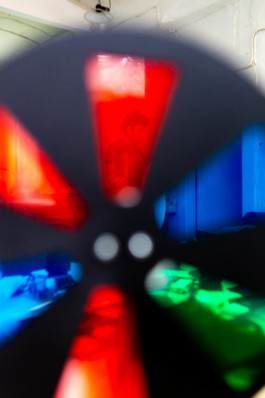
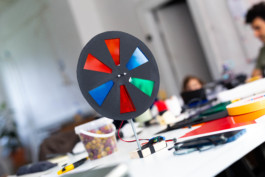
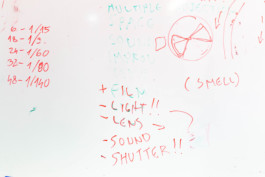
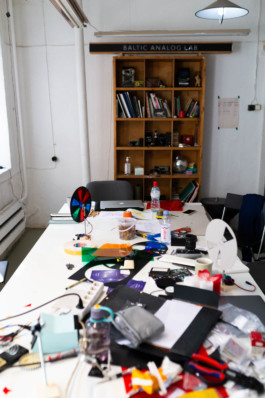
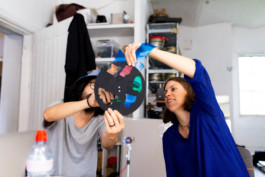
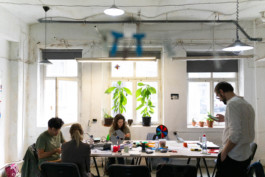
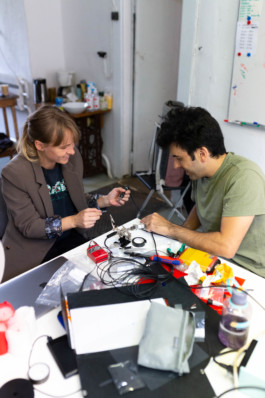
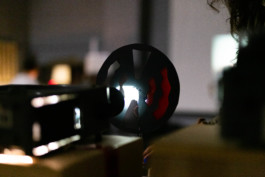
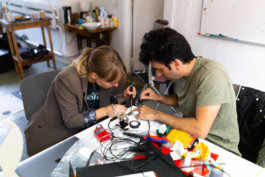
By Other Means for Other Ends
Expanded Cinema Workshop
An examination of analog techniques for pushing beyond the limits of the frame, the screen, and the projection space. We approached the projector not as a passive device for the reproduction of coupled images and sounds but as a playable instrument. We built external shutters and contact mics to modify light and sound. In the darkroom, we made direct, positive color prints from found or original footage and used this material to create loops of various lengths.
2023 Polar Film Lab; Tromsø, Norway
2023 Filmverkstaden; Vaasa, Finland
2022 The School of Arts; Ghent, Belgium
2021 BAL; Riga, Latvia
2019 Unza Lab; Milan, Italy
2018 CalArts; Valencia, USA
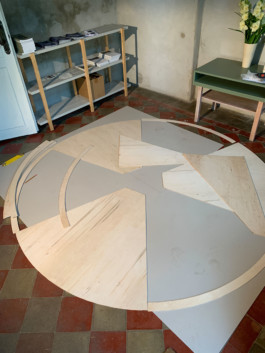
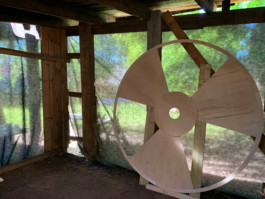
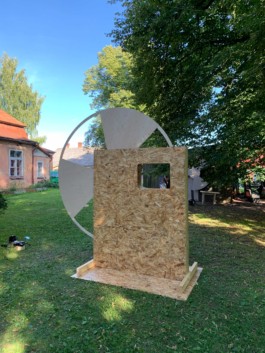
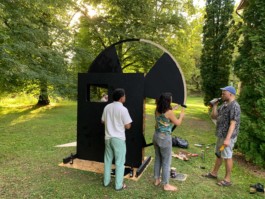

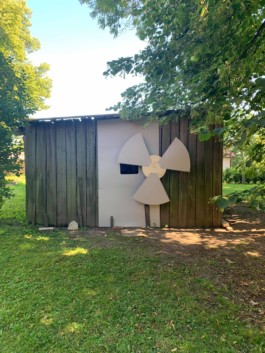
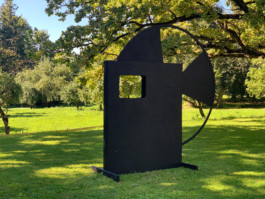
Exterior Shutters
The camera was known as a capturing device. It was a possessor of images. By magnifying basic elements of the cinematic illusion – the shutter and the frame – we wanted to propose a device that could transform perception without fixing the images it framed. In the workshop, we used interior and exterior spaces to create non-possessing simulations of the camera and the projector.
Participants chose the sites and built both shutters collectively. In each setting, the shutter spun in front of the frame creating the traditional flicker effect of motion picture projectors and cameras. The shutters could run at different frame rates. Whatever happened within the frame during the time that the shutter was in motion created the film.
2022 BAL Summer School; Cēsis, Latvia
Traces of Colored Light
Experiments with color reversal
In this workshop, we practiced easy, hands-on techniques for how to shoot, develop, and copy 16mm color film. By using cross-processing and contact printing, we explored the creative possibilities of E6 color reversal chemistry. We shot color negative film and used the reversal process to create positive prints that could be projected right away. We also experimented with contact printing, using a flashlight and color print film.
Supported by the Goethe Institute Porto Alegre.
2016 Cine Esquema Nova; Porto Alegre, Brazil
Add, Replace, Erase, Repeat
Tinting, toning and bleaching 16mm film
In this workshop, we delved into the possibilities of adding color to processed 16mm film. Working on black and white found footage, we learned the techniques of tinting – where we added color to the film with the use of colored dyes – toning – where we replaced the silver particles in the film with colored salts with the use of a chemical bath – and bleaching – where we used bleach to remove the film emulsion from the film base. We also used selective masking to create single strips of film that combined multiple techniques.
2016 17. dresdner schmalfilmtage; Dresden, Germany
In Direct Contact
16mm contact printing
The theory and practice of making and copying images on 16mm film through contact printing. Using a flashlight and color print film, we copied super8,16mm and 35mm negative and positive footage onto 16mm. We used diverse materials to create moving image photograms. We developed the footage using color reversal chemistry.
2015 16. dresdner schmalfilmtage; Dresden, Germany
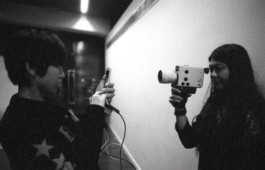
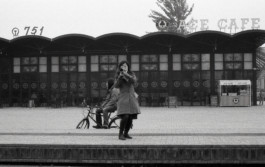
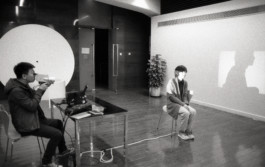
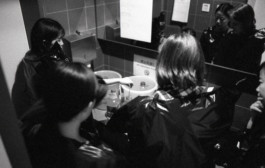

Becoming Again
Shooting and developing Super 8
With this workshop participants learned to shoot, develop, and project Super8mm film. We learned the rules of working with film and how to break them.
Supported by the Goethe Institute Beijing.
2014 UCCA Center for Contemporary Art; Beijing, China
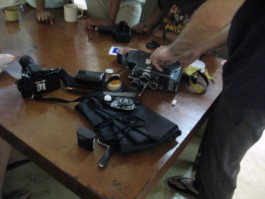
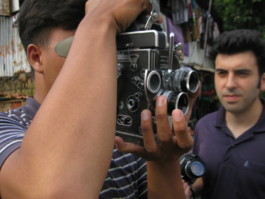
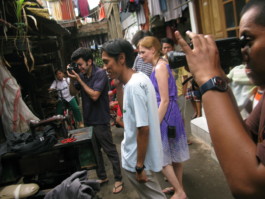
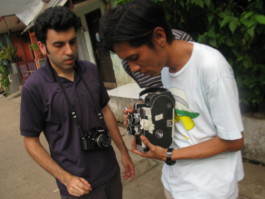
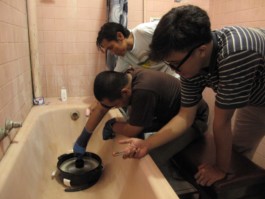
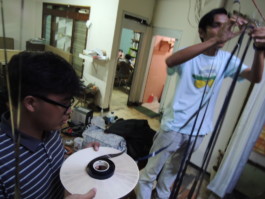
Different Hands Different Eyes
Shooting and developing 16mm
In April 2013 we took part in the ARTLAB residency program hosted by Ruangrupa. At the end of our stay, we conducted a workshop where participants shot a roll of 16mm reversal film in the Tebet neighborhood in Jakarta. They developed the roll in Ruangrupa’s bathroom and we screened the footage in Ruangrupa’s RuRu gallery that evening.
2013 Ruangrupa; Jakarta, Indonesia
Their Attack is our Escape: Collage and the Undead Film
Non-camera filmmaking
The Collage film workshop aimed to provide the knowledge necessary for the creation of non-camera16mm films with the use of a variety of collage techniques. Over the course of the workshop participants learned to directly manipulate 16mm film by cutting, gluing, taping and transferring images, text and other found materials onto a clear film base. Using newspapers, magazines, color gels, photocopies, and computer printouts each participant brought these images back to life.
Supported by the Goethe Institute Beijing.
2012 UCCA Center for Contemporary Art; Beijing, China
We have taught workshops covering a wide range of analog film techniques. These include 16mm and Super8 Shooting and hand developing, camera-less filmmaking, tinting and toning, 16mm contact printing, alternative processing methods, experimental documentary, expanded cinema, animation stand, print inspection, and archiving techniques. For inquiries please contact.
Past workshops (selection)









By Other Means for Other Ends
Expanded Cinema Workshop
An examination of analog techniques for pushing beyond the limits of the frame, the screen, and the projection space. We approached the projector not as a passive device for the reproduction of coupled images and sounds but as a playable instrument. We built external shutters and contact mics to modify light and sound. In the darkroom, we made direct, positive color prints from found or original footage and used this material to create loops of various lengths.
2023 Filmverkstaden; Vaasa, Finnland
2022 The School of Arts; Ghent, Belgium
2021 BAL; Riga, Latvia
2019 Unza Lab; Milan, Italy
2018 CalArts; Valencia, USA







Exterior Shutters
The camera was known as a capturing device. It was a possessor of images. By magnifying basic elements of the cinematic illusion – the shutter and the frame – we wanted to propose a device that could transform perception without fixing the images it framed. In the workshop, we used interior and exterior spaces to create non-possessing simulations of the camera and the projector.
Participants chose the sites and built both shutters collectively. In each setting, the shutter spun in front of the frame creating the traditional flicker effect of motion picture projectors and cameras. The shutters could run at different frame rates. Whatever happened within the frame during the time that the shutter was in motion created the film.
2022 BAL Summer School; Cēsis, Latvia
Traces of Colored Light
Experiments with color reversal
In this workshop, we practiced easy, hands-on techniques for how to shoot, develop, and copy 16mm color film. By using cross-processing and contact printing, we explored the creative possibilities of E6 color reversal chemistry. We shot color negative film and used the reversal process to create positive prints that could be projected right away. We also experimented with contact printing, using a flashlight and color print film.
Supported by the Goethe Institute Porto Alegre.
2016 Cine Esquema Nova; Porto Alegre, Brazil
Add, Replace, Erase, Repeat
Tinting, toning and bleaching 16mm film
In this workshop, we delved into the possibilities of adding color to processed 16mm film. Working on black and white found footage, we learned the techniques of tinting – where we added color to the film with the use of colored dyes – toning – where we replaced the silver particles in the film with colored salts with the use of a chemical bath – and bleaching – where we used bleach to remove the film emulsion from the film base. We also used selective masking to create single strips of film that combined multiple techniques.
2016 17. dresdner schmalfilmtage; Dresden, Germany
In Direct Contact
16mm contact printing
The theory and practice of making and copying images on 16mm film through contact printing. Using a flashlight and color print film, we copied super8,16mm and 35mm negative and positive footage onto 16mm. We used diverse materials to create moving image photograms. We developed the footage using color reversal chemistry.
2015 16. dresdner schmalfilmtage; Dresden, Germany





Becoming Again
Shooting and developing Super 8
With this workshop participants learned to shoot, develop, and project Super8mm film. We learned the rules of working with film and how to break them.
Supported by the Goethe Institute Beijing.
2014 UCCA Center for Contemporary Art; Beijing, China






Different Hands Different Eyes
Shooting and developing 16mm
In April 2013 we took part in the ARTLAB residency program hosted by Ruangrupa. At the end of our stay, we conducted a workshop where participants shot a roll of 16mm reversal film in the Tebet neighborhood in Jakarta. They developed the roll in Ruangrupa’s bathroom and we screened the footage in Ruangrupa’s RuRu gallery that evening.
2013 Ruangrupa; Jakarta, Indonesia
Their Attack is our Escape: Collage and the Undead Film
Non-camera filmmaking
The Collage film workshop aimed to provide the knowledge necessary for the creation of non-camera16mm films with the use of a variety of collage techniques. Over the course of the workshop participants learned to directly manipulate 16mm film by cutting, gluing, taping and transferring images, text and other found materials onto a clear film base. Using newspapers, magazines, color gels, photocopies, and computer printouts each participant brought these images back to life.
Supported by the Goethe Institute Beijing.
2012 UCCA Center for Contemporary Art; Beijing, China